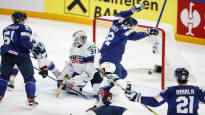In the World Championships in hockey, there has been no break between the semi-finals and the final since 2011. In the final, the winner of the previous semi-final is strong. Sports expert Ismo Lehkonen emphasizes the importance of sleep.
28.5. 10:26 • Updated May 28th. 10:33
After the semi-finals of the World Hockey Championships, there has been no break since 2011, when Finland won the championship in the spring of Bratislava. When the semi-finals and finals are played on consecutive days, the importance of the match order is emphasized.
In the previous three World Championships, the country that progressed from the previous semi-final to the final has always taken the World Cup gold. Since 2012, the winner of the previous semi-final has celebrated the championship seven times out of nine.
Sports Expert Ismo Lehkonen estimates that the statistics are by no means a coincidence.
– The biggest thing here is the player’s sleep rhythm. For those who play in a later semi-final, falling asleep suddenly stretches to two or a half to three when the second finalist gets to sleep at normal time. There is a huge difference, Lehkonen says.
An experienced hockey player knows that overcoming the physical and especially mental strain of an evening game is not easy. Falling down the emotional turmoil takes time and directly affects your night’s sleep.
– The athlete’s best time for a deep sleep is 2-5 at night. After the evening game, that stage can be missed because the day will be long with its final rehearsals.
At the World Championships, times have been set in recent years. For example, in 2018 and 2019, it was 25 hours from the start of the later semi-final to the start of the final, but since then the interval is 26 hours.
In Tampere, Finland and the USA will meet in the first semi-final at 2.20 pm and Canada and the Czech Republic will meet later at 6.20 pm. The lion match program has aroused envy in Sweden, for example. Finland has made it to all the games with the big discus countries recovered.
The final will be played on Sunday at 8.20 pm.
– Professional coaches are always accurate about match programs. The toughest moves are made before the tournament. Jukka Jalonen was already awake at the 20-year-old World Championships in 2016. Even now, Finland has fenced off a good program and others have been tweeting. “Fair Play” can be forgotten in that matter, and Finland has done nothing wrong, Lehkonen laughs.
2021: Canada (previous semi-final)
2019: Finland (previous semi-final)
2018: Sweden (previous semi-final)
2017: Sweden (later semi-final)
2016: Canada (subsequent semi-final)
2015: Canada (previous semi-final)
2014: Russia (previous semi-final)
2013: Sweden (previous semi-final)
2012: Russia (previous semi-final)
